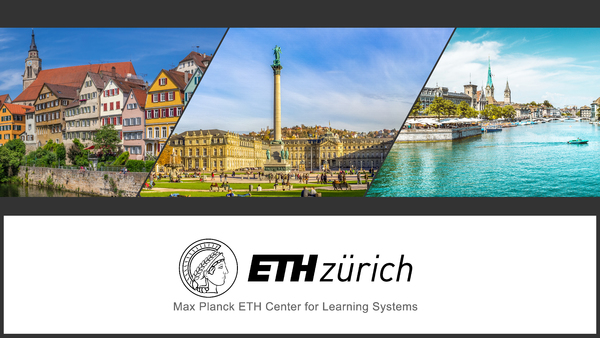Open Position
Here you find potential opportunities to become a PhD or postdoctoral researcher in our lab and acquire funding for it.
ETH RobotX PhD and Postdoctoral Positions

ETH RobotX, the center for robotics at ETH Zurich, is continuously searching for excellent and motivated PhD students and Postdoctoral Researchers eager to advance the field of robotics through innovative research. The Soft Robotics lab is part of ETH RobotX and constantly hiring through this program.
We offer fo example the following research topics in robotics:
- Soft and Musculoskeletal Robotics: Designing and fabricating bioinspired robots using compliant materials for adaptable and safe interactions in an unstructured world.
- Robotic Manipulation: Creating innovative solutions for the design and learning-based control of dexterous robotic manipulators to enhance interaction in complex environments.
- Biohybrid Robots: Creating robots from living cells, tissues, and synthetic materials that are powered by chemical energy and can interact with and reason about the world
Application to ETH RobotX
Applications are open between August 15 and December 15. Final decisions will be communicated latest on the following February 15.
To find further information and apply:
- PhD position on jobs.ethz.ch.
- Postdoc positions on jobs.ethz.ch.
Please follow carefully the instructions in the corresponding link, incomplete application will not be considered.
Swiss Government Excellence Scholarship (ESKAS)

The Swiss Government Excellence Scholarships support outstanding international researchers to undertake research at Swiss public universities such as ETH Zurich. Selection and funding are administered by the Federal Commission for Scholarships for Foreign Students (FCS/ESKAS).
What it funds (scholarship types most relevant for the Soft Robotics Lab):
- Research Fellowship (doctoral level): research stay in Switzerland, typically 12 months.
- PhD Scholarship: full PhD in Switzerland, up to 36 months.
- Postdoctoral Scholarship: 12-month postdoc research stay in Switzerland.
Further details and the application can be found external page sbfi.admin.ch.
ETH AI Center PhD or Post-Doc Fellowship @ Soft Robotics Lab

We are excited to be part of the ETH AI Center Fellowship. Are you interested in doing a PhD or postdoc with us on topics such as learning methods for dexterous robotic manipulation, surrogate modeling of multiphysical robotic systems, or automated computational design of musculoskeletal robots?
The AI Center's flagship PhD & Post-Doc Program is focused on advancing interdisciplinary AI research. This can be on topics that relate to AI foundations and/or AI application areas such as robotics. The idea is that fellows work with two Principal Investigators that are core or associate members of the ETH AI Center. Key selection criteria are the candidate's research excellence, ability to excel in interdisciplinary collaborations, and show an impact orientation. It is advisable to identify at least three faculty as potential mentors before applying for this fellowship.
Application Deadline: Every Year Early to Mid November
Please apply at https://ai.ethz.ch/apply and select Prof. Robert Katzschmann (ETH AI Center core member) in the application form.
CLS PhD Fellowship @ Soft Robotics Lab

The external page Max Planck ETH Center for Learning Systems (CLS) offers a fellowship program, where PhD students are co-supervised by one advisor from ETH Zurich and one from the Max Planck Institute for Intelligent Systems in Tübingen and Stuttgart. PhD students are expected to take advantage of the opportunities offered by both organizations and to actively seek cross-group collaborations. Each PhD fellow will have a primary location and spends one year at the other location as well.
Application Deadline: Every Year Early to Mid November
Further details and the application are here: external page https://learning-systems.org/apply
PhD Fellowships from Technology Companies

A number of technology companies regularly advertise so-called "PhD Fellowships" in the field of computer science, artificial intelligence and machine learning. Learn more about these opportunities here.
All Postdoctoral Fellowship Options

There are multiple fellowship options to fund a PostDoc at ETH Zurich. Reach out to us if you like to apply to one of the following funding schemes, we are happy to support you if the research topic makes sense.
Options for right after the completion of a PhD:
- ETH AI Center Postdoc Fellowship
- ETH Postdoc Fellowship
- external page RobotX PostDoc
- external page MSCA Postdoc Fellowship
- external page Branco Weiss Fellowship
- external page SNSF Ambizione Grant
- external page Schmidt Science Fellow
- external page Swiss Government Excellence Scholarships
Options eligible a year or more after the completion of the PhD:
Direct application to Soft Robotics Lab

For a direct application to our laboratory, please use the RobotX PhD and Postdoc Fellowship options. Here are the direct links:
In this online application, mention in your cover letter that you are interested in working with Prof. Robert Katzschmann and the Soft Robotics Lab. Prof. Katzschmann is constantly monitoring the applications that are submitted to those two openings and might reach out to you already before the current application deadline.
Your online application must contain the following documents (exactly in this order) in a single merged and compressed PDF file.
- Cover letter detailing your research motivation, interests, and experience
- Curriculum Vitae (CV)
- Academic transcripts of all degrees in English (Bachelor's and Master's)
- Three professional reference contacts, including an email and a direct phone number to reach them
- A publication or thesis work sampling your academic reasoning and writing (choose your favorite work so far)
The PDF's filename should contain the application date (YYMMDD) and your last name as well as first name (for example, applicant Jane Miller applying on 1 March 2026 would write: "260301_MillerJane_application.pdf").
Please note that we exclusively accept applications submitted through our online application portal. Applications via email or postal services will not be considered.